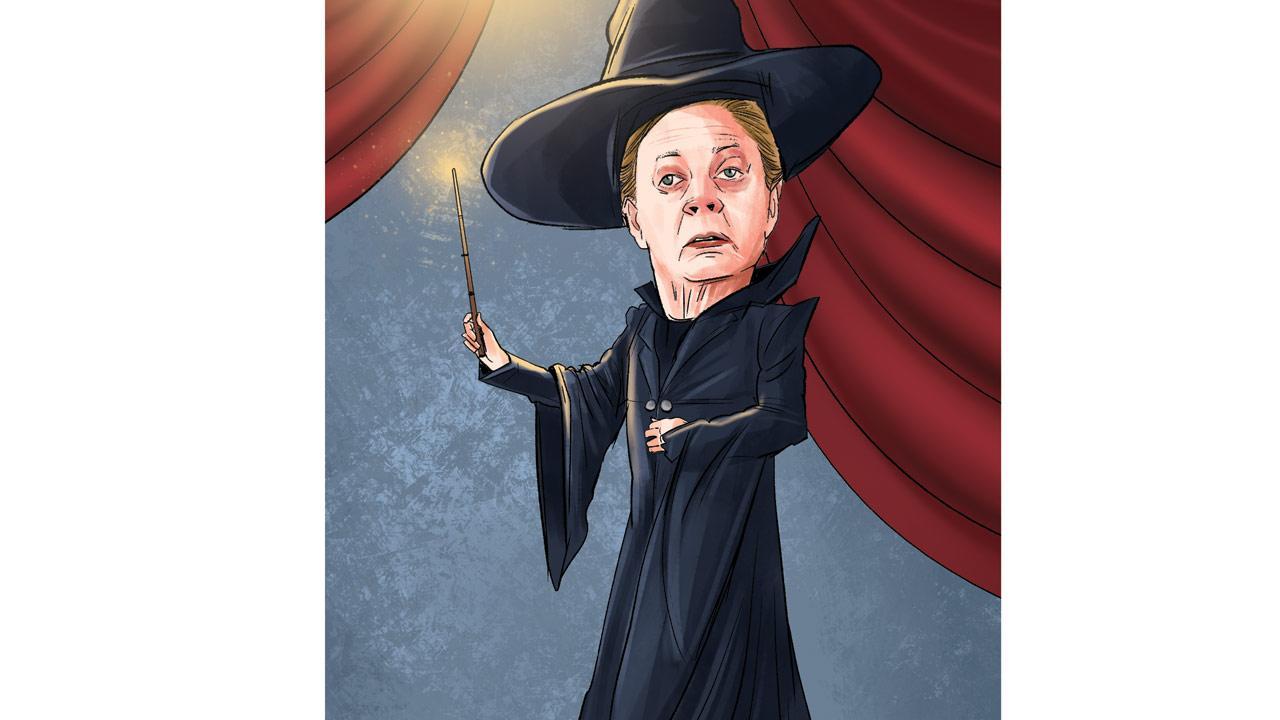She could be rich, she could be regal, she could be royal.

Illustration/Uday Mohite
 I will always be grateful to the Harry Potter series, Downton Abbey, Game of Thrones and the Lord of the Rings movies—these shows/series starred fairly obscure but brilliant British stage actors from the National Theatre, and catapulted them to international superstardom. Actors who’d slaved for years on London stages, night after night, bagging the odd Hollywood role, but by and large, remaining stage craftsmen in their native land.
I will always be grateful to the Harry Potter series, Downton Abbey, Game of Thrones and the Lord of the Rings movies—these shows/series starred fairly obscure but brilliant British stage actors from the National Theatre, and catapulted them to international superstardom. Actors who’d slaved for years on London stages, night after night, bagging the odd Hollywood role, but by and large, remaining stage craftsmen in their native land.
One of these performers was Maggie Smith, The Prime of Miss Jean Brodie and California Suite gave her early Oscars, but for all her histrionic heftiness, for the most part her popularity remained in the United Kingdom—for audiences weaned on streaming platforms, and multiplexes and movie houses she was a character actress, a Mother Superior in Sister Act.
(Judy Dench had bagged ‘M’ in the Bond movies by then) But then in 2001, someone smart in the Harry Potter and the Sorcerors Stone casting set—up saw in Maggie Smith, the potential to be Minerva McGonagall, professor at Hogwarts School of Witchcraft and Wizardry. The franchise gave Maggie, a toe hold and then a massive footprint in Hollywood and earned her world-wide popularity. Smith drily summarised her later roles as “a gallery of grotesques,” including Professor McGonagall. Asked why she took the role, she quipped, “Harry Potter is my pension.”
And then came Downton Abbey, and Lady Violet Crawley, Countess of Grantham was born, and the series made television history with multiple seasons. I watched Maggie Smith, closely, as I did Judie Dench and Ian McKellen in plays at the West End, their training was theatre, and essentially, Shakespeare is where they honed their craft. The question was how would they fare in cinema.
Mrs Smith, had two abilities, that in my view, separate the good from the great actors—she was equally adept on stage and screen—not all stage actors have conquered film; more importantly they don’t have the requisite skills to scale both mountains successfully—stage actors often play film too big, they tend to over express, to over project, (for camera it seems ‘overacting’), subtlety is a hard one for them, they’ve been taught to reach out to the Z row of an auditorium, a Zoom lens requires minute facial movements, very hard for hard-nosed stage actors to achieve “downsizing”.
The opposite is also true, primarily screen actors find stage very hard—from having to learn pages and pages of lines by heart, to perform show after show with consistency, to not get thrown by ‘mistakes’, to improv when needed, and to reach out to an audience, to make them feel your pain, no camera lenses, just your larynx for support. You make a mistake, no director shouting “cut”, no retakes—the show must go on. Maggie Smith had cracked the code for both mediums.
For all her talent, there was no baggage, her motto being “how can I better the script with my performance”. Not how can I alter the script to better my role.
She could be rich, she could be regal, she could be royal.
She could be withering. She could be waspish, she could be wizardly, she could be witty, she could be wicked, she could be wickedly witty, she could be wittily wicked.
She could be big, she could be small, she could be bent, she could be bolt upright, she switched from kind to cruel with a twitch, she was scandalous. She could with one withering look go from riches to rags.
But she was at all times fearless, she risked emotion, all her life, on screen and off it.
She remained in demand even in her later years, despite her lament that “when you get into the granny era, you’re lucky to get anything.” Amen to that. Rest well, Maggie, Mother Superior, Minerva McGonagall. The curtains will never close on you.
Rahul daCunha is an adman, theatre director/playwright, photographer and traveller. Reach him at rahul.dacunha@mid-day.com
 Subscribe today by clicking the link and stay updated with the latest news!" Click here!
Subscribe today by clicking the link and stay updated with the latest news!" Click here!








